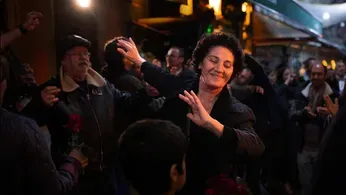
July 25, 2024
Review: 'Crossing' is an Admirable Look at Queer Acceptance Across Generations
C.J. Prince READ TIME: 3 MIN.
In a Georgian town, retired schoolteacher Lia (Mzia Arabuli) shows up at the doorstep of someone's house asking if they've seen her estranged transgender niece, Tekla, who lived in the area. One of the home's residents, the young, cocky Achi (Lucas Kankava), informs her that Tekla left town to try and start anew in Istanbul. Lia, who wants to fulfill her dying sister's wish of reconnecting Tekla with her family, immediately heads to Turkey, with Achi tagging along as he claims to know her new address. In reality, Achi sees Lia as an opportunity to flee town and, like Tekla, start over in a new country.
As the title implies, "Crossing" is a film about intersections, and writer/director Levan Akin lets his story unfold through a series of them: The crossing of borders, the generational difference between Lia and Achi, the crossover of Georgian and Turkish culture, and the intersection between its two leads and the transgender community in Istanbul. Akin, who directed the 2019 film "And Then We Danced," maintains the intimate, character-based approach he effectively used in his prior film. The result is a respectable, yet limited, film, with an unfortunate habit of refusing to stray too far from convention.
Akin does make a good effort at subverting expectations as the setup of the search for a missing person quickly takes a backseat. It takes little time for the film to set the scene before Lia and Achi hop on the ferry to Turkey. Akin uses a lengthy Steadicam shot wandering around the boat before settling on Evrim (Deniz Dumanli), a transgender woman working as a lawyer for an NGO in Istanbul. That introduction brings Evrim into the film as a second narrative thread, where she spends her time helping members of the queer community and starting up a romantic fling with a taxi driver.
It takes some time before the inevitable crossover of these two storylines. That benefits the film, since Akin's strengths lie in observing Lia, Achi, Evrim, and the people they encounter living their lives from one day to the next. Akin portrays Istanbul as a city made up of nothing but crossings between different types of people, and how those connections make people find things in common as a means of coexisting. For the stubborn, yet sensitive, Lia, her tough exterior begins to crack as she finds herself through other people; Achi gets a taste of the freedom he craves through befriending people staying at the same hostel; and Evrim uses her skills to help others, while she faces the constant hurdles of existing in an environment that doesn't always welcome her. (Akin thankfully takes a measured approach with the anti-queer attitudes in Turkish government and society, making it known without letting his queer characters be defined by it.)
Those journeys, and the moments where all three can find ways to fully express themselves (it should come as no surprise that some of these moments involve dancing) are where "Crossing" feels most alive, with Akin filling out enough details to show an entire world that exists outside of its plot. But the film eventually gets itself back on course, with Evrim eventually getting involved with finding Tekla, and lines of dialogue doubling as blunt, thematic weapons. (At one point, Lia tells Achi that some people come to Istanbul just to disappear, and she might as well be telling it straight to the camera.) There's a sense of obligation in the way "Crossing" wraps things up in its final act that feels burdensome compared to the free-flowing sections before it. One wishes the film could have taken inspiration from its characters to go in its own direction, instead of sticking to expectations.
"Crossing" opens in theaters July 25.







